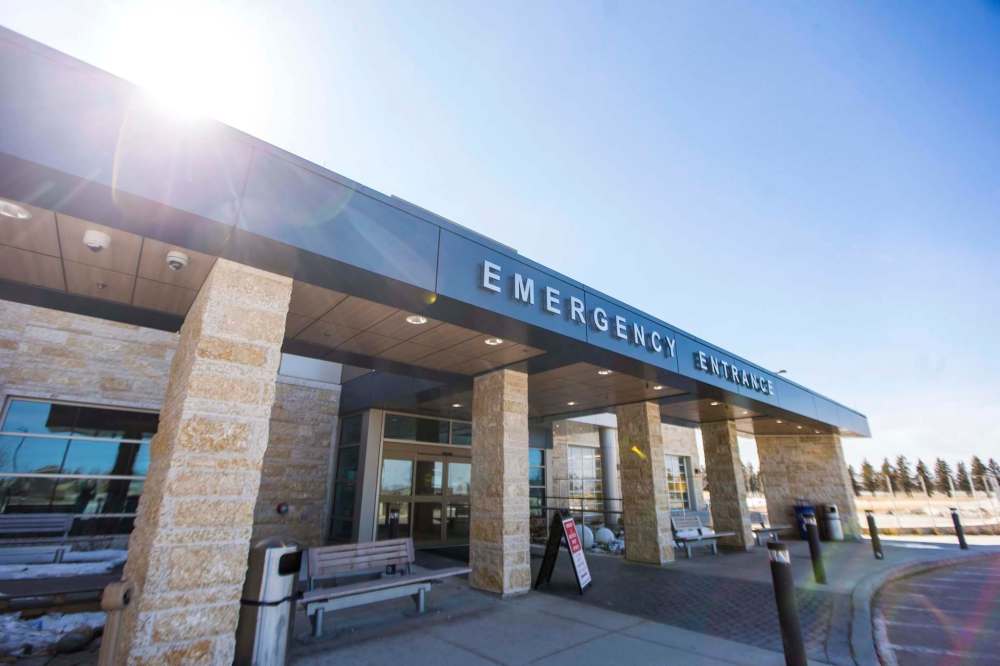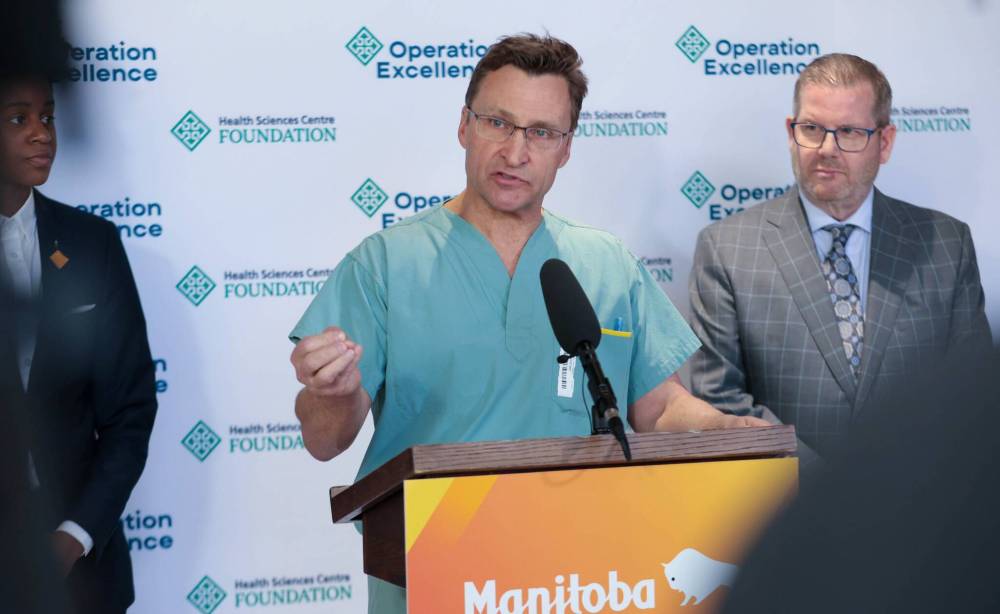NDP promised 800 hip, knee replacements in Selkirk this year; just 79 done so far
Read this article for free:
or
Already have an account? Log in here »
To continue reading, please subscribe:
Monthly Digital Subscription
$0 for the first 4 weeks*
- Enjoy unlimited reading on winnipegfreepress.com
- Read the E-Edition, our digital replica newspaper
- Access News Break, our award-winning app
- Play interactive puzzles
*No charge for 4 weeks then price increases to the regular rate of $19.95 plus GST every four weeks. Offer available to new and qualified returning subscribers only. Cancel any time.
Monthly Digital Subscription
$4.99/week*
- Enjoy unlimited reading on winnipegfreepress.com
- Read the E-Edition, our digital replica newspaper
- Access News Break, our award-winning app
- Play interactive puzzles
*Billed as $19.95 plus GST every four weeks. Cancel any time.
To continue reading, please subscribe:
Add Free Press access to your Brandon Sun subscription for only an additional
$1 for the first 4 weeks*
*Your next subscription payment will increase by $1.00 and you will be charged $16.99 plus GST for four weeks. After four weeks, your payment will increase to $23.99 plus GST every four weeks.
Read unlimited articles for free today:
or
Already have an account? Log in here »
Hey there, time traveller!
This article was published 12/05/2025 (240 days ago), so information in it may no longer be current.
Just 79 hip and knee surgeries have been completed at Selkirk Regional Health Centre so far this year after the Manitoba government promised 800 would be performed in 2025.
The pledge was part of the NDP’s plan to meet demand and reduce wait times.
The Selkirk program announced in November — which added staff and expanded operating space — was to launch in January, but did not start until March.

The 79 hip and knee procedures performed between March 12 and May 4 — close to 10 per week — put the program on track for about 520 surgeries this year, a significant reduction from the promised 800.
The Selkirk hip and knee surgery program is limited to patients who can be discharged in a day and don’t need lengthy hospital stays.
However, the pace is picking up, according to the Interlake-Eastern Health Region.
“The program continued to increase the number of patients accessing surgeries in April as it moves towards target by increasing surgeries,” the region said in an email Monday.
No one overseeing the program was made available for an interview. Neither was Health Minister Uzoma Asagwara.
“The average number of patients accessing hip and knee surgeries in May is increasing and the number will continue to grow as we work towards achieving our target goal of 800 surgeries completed per fiscal year,” the health region email said.
Dr. Ed Buchel, the provincial surgery specialty lead for Shared Health, said at the program’s Nov. 27 announcement that 800 additional surgeries each year at one site is an “astronomical number” representing fundamental change, and that, provincewide, capacity would rise to nearly 7,800 joints per year, matching the needs of Manitoba’s population.
Buchel said the increased capacity would spare any new patients from becoming “long-waiters” whose surgery date — if they’re able to obtain one — is more than a year down the road.
Asagwara took the opportunity at that event to take a shot at the previous Tory government, which had formed a surgical wait-time task force that sent some Manitoba patients to other provinces and to the United States to get needed surgeries.
The task force was scrapped in 2023 when the NDP formed government promising to redirect funding to the public system.
“We know as a government that cutting wait times… does not have to be complicated,” Asagwara said at the November announcement.
“We’re talking about people who are in pain, many people whose lives have been drastically altered by the fact that they need an orthopedic surgery.”–PC Health Critic Kathleen Cook
“You don’t need to send folks out of province or out of the country to get the essential surgical care that they need and can get, and deserve to get, right here at home.”
On Monday, critics accused the province of over-promising and under-delivering on the plan.
“I would like to see the promises that are made be realistic and more to do with the actual investment into the system,” said Manitoba Association of Health Care Professionals president Jason Linklater.
“Based on the (promised) number of 800 cases, it would be very ambitious at this point, because they’re only on track to do a little over half of that.”
Progressive Conservative health critic Kathleen Cook said Monday that while there’s nothing wrong with being ambitious, the NDP have given people false hope.
“We’re talking about people who are in pain — many people whose lives have been drastically altered by the fact that they need an orthopedic surgery,” said the MLA for Roblin.
Physicians advocacy group Doctors Manitoba said it had anticipated that Selkirk’s increase in hip and knee surgeries would take time to get up and running, and that it’s important to ensure that adding hip and knee surgeries there doesn’t take away from other procedures at the hospital.
The organization said its overall concern is with the growth in the wait list and wait times.
“While 800 more surgeries in Selkirk is a significant and positive 12 per cent boost to the total number of hip and knee surgeries done in Manitoba, it is not keeping up with the wait list, which has grown by 1,471 patients, or 28 per cent, over the last year,” a spokesman said.
“This means the current wait time of 32 weeks, which is already beyond the medically recommended benchmark and the Canadian average, is at risk of getting even longer in the months ahead.”
In the 2024-2025 fiscal year, 6,059 hip and knee surgeries were performed in the province, according to Manitoba Health online data. The number of Manitobans waiting was 6,652 as of February.

Ruth Bonneville / Free Press files
Dr. Ed Buchel, the provincial surgery specialty lead for Shared Health, has said the expected increase in capacity for hip and knee replacements would prevent any new patients from being "long-waiters" for surgery.“I think everybody wants to see government meet those types of targets, because it benefits everybody,” Linklater said.
But a shortage of diagnostic imaging, lab, physiotherapy and occupational therapy professionals needed to successfully implement such a plan, ensures it’s not realistic, he said.
“It’s really important that government takes into consideration the entire picture when they’re implementing this much-needed change to be able to increase capacity,” Linklater said.
Investing in education to get more young people into allied health professions to staff up such programs is needed.
“That eventually gets you to a place where you don’t have things like backlogs and wait lists, because that’s going to take a long time to clean up,” Linklater said.
During the COVID-19 pandemic, many surgeries — including hip and knee replacements — were postponed as the health-care system was overwhelmed with critically ill Manitobans and staffing levels already stretched thin.
carol.sanders@freepress.mb.ca
“We’re talking about people who are in pain.” – PC health critic Kathleen Cook

Carol Sanders
Legislature reporter
Carol Sanders is a reporter at the Free Press legislature bureau. The former general assignment reporter and copy editor joined the paper in 1997. Read more about Carol.
Every piece of reporting Carol produces is reviewed by an editing team before it is posted online or published in print — part of the Free Press‘s tradition, since 1872, of producing reliable independent journalism. Read more about Free Press’s history and mandate, and learn how our newsroom operates.
Our newsroom depends on a growing audience of readers to power our journalism. If you are not a paid reader, please consider becoming a subscriber.
Our newsroom depends on its audience of readers to power our journalism. Thank you for your support.




